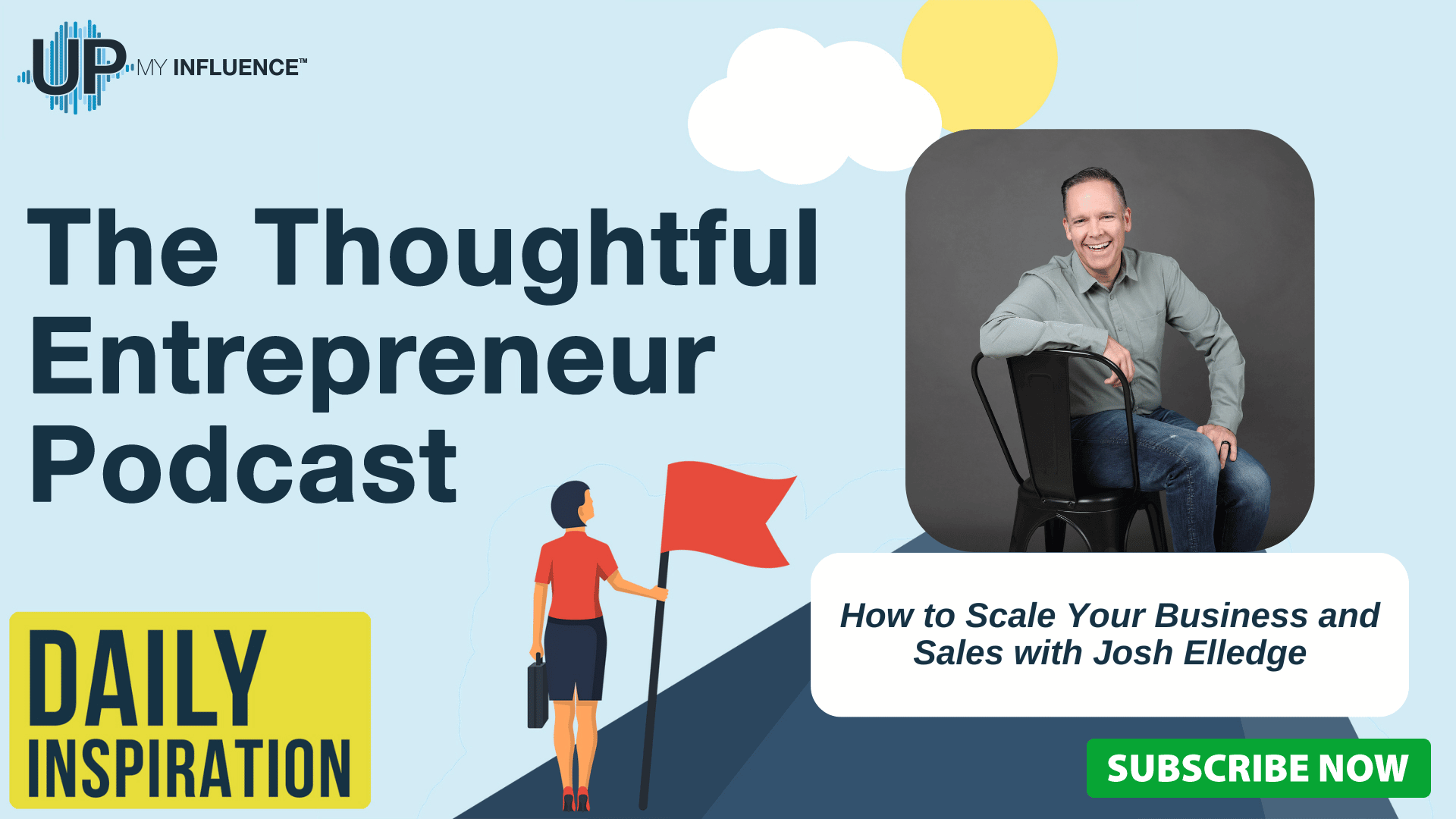THE THOUGHTFUL ENTREPRENEUR PODCAST
In this special episode, Josh Elledge, founder of Up My Influence, discusses his philosophy on sales and marketing.

As the founder of Up My Influence, Josh been fortunate to generate over $10 million in revenue over the past 15 years, and he is eager to share some of the strategies that have helped me achieve this.
In his experience, consistency and predictability are crucial to generating consistent and predictable sales activity. Building relationships and participating in whisper networks can be incredibly valuable.
At Up My Influence, they've launched over 200 podcasts to make guests feel significant and serve audiences. Josh believes in connection's power and the importance of making every interaction meaningful.
Sales numbers can sometimes be viewed negatively, but Josh believes it's crucial to approach sales with curiosity and a genuine desire to build relationships. When meeting with a potential client, the focus should be on being genuinely curious about the other person and exploring ways to help each other.
In dealing with demanding clients, Josh advises being selective and not taking on clients who may be toxic or not a good fit culturally. A bad client can have a negative impact on the business and team morale. It's important to set boundaries and ensure that your team only works with good people.
One of the most critical lessons Josh learned is the power of generosity. Showing up positively in people's lives and being thoughtful can lead to unexpected opportunities and connections.
Key Points from the Episode:
- Importance of consistency and predictability in sales
- Building relationships and participating in whisper networks
- Importance of curiosity and genuine interest in potential clients
- Building strong relationships with leaders and treating them as intelligent individuals
- Potential downsides of relationship-building selling and how to overcome them
- Selling a personalized service and providing value to potential clients
- Avoiding the traditional “lead” and “salesperson” dynamic
- Dealing with difficult clients and the negative impact they can have
- Josh Elledge's journey as an entrepreneur and the success of Savings Angel
- Adapting to new innovations and disruptive technologies
- Using platforms to celebrate others and build meaningful relationships
- The power of generosity and leaving a positive trail
About Josh Elledge:
Josh Elledge is a seasoned entrepreneur and business leader dedicated to helping thoughtful business leaders maximize their sales potential. With a focus on leveraging authority and building meaningful relationships, Josh guides businesses away from traditional spammy lead-generation tactics.
As the founder of SavingsAngel.com, he achieved seven-figure annual sales without relying on paid ads, emphasizing the importance of standing out in a crowded market.
Inspired by the belief that advertising is the price of being unremarkable, Josh emphasizes leading with generosity. His extensive experience in PR led him to co-create UpMyInfluence in 2014, initially a media consulting and PR agency.
Recognizing the impact of their approach on sales and revenue growth, the company evolved to help clients achieve consistent and predictable B2B sales by harnessing authority, generosity, and platform. Josh's innovative strategies have enabled numerous businesses to succeed in the competitive landscape.
About Up My Influence:
UpMyInfluence is a revolutionary platform empowering entrepreneurs to enhance their sales through cost-effective PR solutions. Offering step-by-step tools, coaching, and PR hacks, they guide clients to attract their ideal audiences.
Membership perks include online tools, webinars, and personalized coaching, covering diverse topics like kickstarting sales funnels and achieving social media prominence. Services encompass media monitoring, PR authority audits, press kits, and personal podcast host introductions.
Distinguishing themselves, UpMyInfluence provides Platinum Level clients with 100-120 media and influencer connections and 1,800 press release media placements annually.
UpMyInfluence collaborate with PR and marketing agencies, offering a-la-carte services like marketing, SEO, social media management, creative work, and event PR.
Catering to entrepreneurs, startups, e-commerce, and business owners, UpMyInfluence's unique approach, operating as a lean startup with affordable monthly services and no contracts, sets them apart in the competitive PR landscape. Founder Josh Elledge's firsthand experience ensures tried-and-true methods for success.
Tweetable Moments:
04:14 – “If you give enough value and if you share enough trust and vulnerability with your audience, you'll get everything you want and need.”
04:26 – “What you need to do is put other people's needs first, and the other stuff will happen.”
52:57 – “Generosity is the gift that will keep you in business and will allow you to thrive and scale like never before.”
Apply to be a Guest on The Thoughtful Entrepreneur:
https://go.upmyinfluence.com/podcast-guest
Don’t forget to subscribe to The Thoughtful Entrepreneur and thank you for listening. Tune in next time!
More from UpMyInfluence:
We are actively booking guests for our The Thoughtful Entrepreneur. Schedule HERE.
Are you a 6-figure consultant? I’ve got high-level intros for you. Learn more here.
What is your #1 Lead Generation BLOCKER? Take my free quiz here.
Want to learn more about all the podcasts managed by UpMyInfluence? Opt in here.

